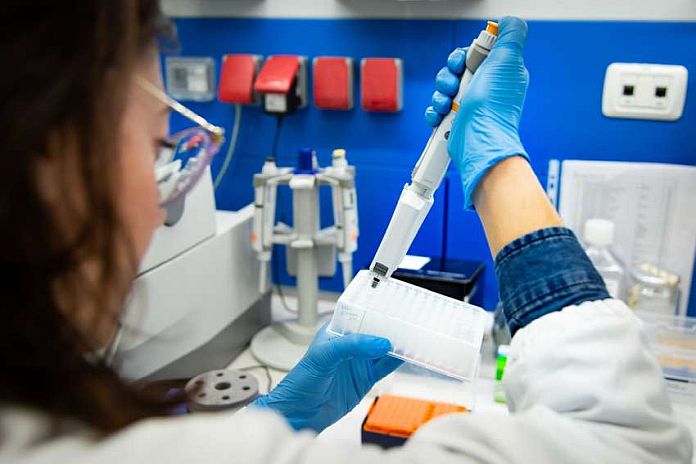By Quinton Amundson
MONTREAL, Canada, (The Catholic Register) – With danger comes some interesting prospects in the field of gene therapy and genome editing, Dr. Brett Salkeld believes.
It’s something the archdiocesan theologian for Regina will examine with a November 15 presentation at Newman Theological College in Edmonton.
Salkeld’s lecture, “Promise and Peril: Gene Therapy, CRISPR and Catholic Ethics,” contemplates moral questions about these medical technologies largely not considered in worldwide discourse.
CRISPR stands for Clustered Regularly Interspaced Short Palindromic Repeats. It is a family of DNA sequences in the bacterial immune system defending against invading viruses. Over the past decade, researchers have discovered how to adapt or repurpose these structures into the CRISPR-Cas9 tool, which operates like a pair of “genetic scissors” on DNA. Once CRISPR-Cas9 cuts DNA, scientists can add or delete pieces of genetic material or replace the existing segment with a customized DNA sequence.
Ethicists fixate on whether this innovation can create “superhumans.”
“Can we artificially elevate people’s IQ, their life span, their muscle mass?” asks Salkeld. “We could then get vain and say, ‘We want blue-eyed, blond-haired kids who look this way,’ or whatever. There are questions beyond therapeutic uses about what can you do with this, and are these enhancements morally legitimate or not?”
Salkeld became captivated by this field in part because of author Walter Isaacson’s 2021 biography of American biochemist Jennifer Doudna, a pioneer of CRISPR-Cas9 gene editing. Isaacson raises concerns about the safety of employing this tool on humans and whether there will be equity of access. Will CRISPR be so expensive that only rich people can afford to be “upgraded”?
According to Salkeld, Isaacson and other experts are not as interested in discussing the chilling possibility of this technology creating “sub-humans.”
“It is not that we would enhance one group of people, although that might have its problems. But we might actually take away aspects of a person’s humanity to make them better soldiers, prostitutes or whatever they might be.”
Salkeld uncovered remarks made by Russian president Vladimir Putin on this subject in 2017. Putin reportedly told youth at a festival in Sochi, Russia, that “a man has the opportunity to get into the genetic code created by either nature or as religious people would say, by the God.”
Though there are many conceivable hazards, Salkeld said tantalizing possibilities exist with gene therapy (correcting defects to prevent or cure genetic diseases) and gene editing.
“I think disease is the biggest thing,” said Salkeld. “Single genetic mutation diseases would be the first thing on the chopping block. Something like Huntington’s Disease, which you would not wish on anybody, is a single mutation. Cancers will be more complicated, some more related to single mutations than others, but if we get good at this it could become a major player in cancer treatments.”
Much like artificial intelligence, society appears to be going full steam ahead with these medical technologies despite profound reservations. These medical-scientific revolutions are considered pillar elements of the so-called “Fourth Industrial Revolution” espoused by international non-governmental organizations, chiefly the World Economic Forum (WEF) headquartered in Davos, Switzerland.
Klaus Schwab, the founder and executive chairman of the WEF, wrote in 2016 that the Fourth Industrial Revolution “is characterized by a fusion of technologies that is blurring the lines between the physical, digital and biological spheres.”
Schwab told broadcaster Charlie Rose in 2015 “that the difference of this fourth industrial revolution is it doesn’t change what you are doing, it changes you if you take genetic editing.”
Examined from a Catholic ethics lens, Salkeld said, “The Church’s teaching is much more nuanced than ‘yes’ or ‘no.’ ”
“The Church is keen to distinguish between somatic cell treatment, which involves the treatment of bodily cells in an already-conceived person,” said Salkeld. “The Church is much more skeptical about germline gene therapy, where you would actually alter gametes, so certain characteristics cannot be passed down.
“Curing Huntington’s Disease in an individual, the Church is like, by all means,” added Salkeld. “If you can do that, carry on. But if you say, ‘We can manipulate (the gametes of) everyone who is a carrier for Huntington’s Disease so that it will be weeded out of the gene pool,’ the Church is a lot more cautious. It says, ‘Given what we know right now, that is way too risky. Our knowledge is far too limited to start messing with a system that is so complex that we don’t know of all the possible outcomes.’ ”
The theologian would not be surprised if an attendee at his Edmonton presentation questioned if Catholics should endorse any development in this field because gene therapy and CRISPR-Cas9 are “man playing God.”
“Playing God is an interesting phrase, actually. There are things that we shouldn’t do because they are morally wrong, but if there are no other moral problems with something, it is not wrong to do something – I’m not sure of the implication – because it seems very powerful. Extending human life could be framed as playing God in a certain way, but there is nothing wrong with it in itself. There is only something wrong if you are doing it in an immoral way.”







